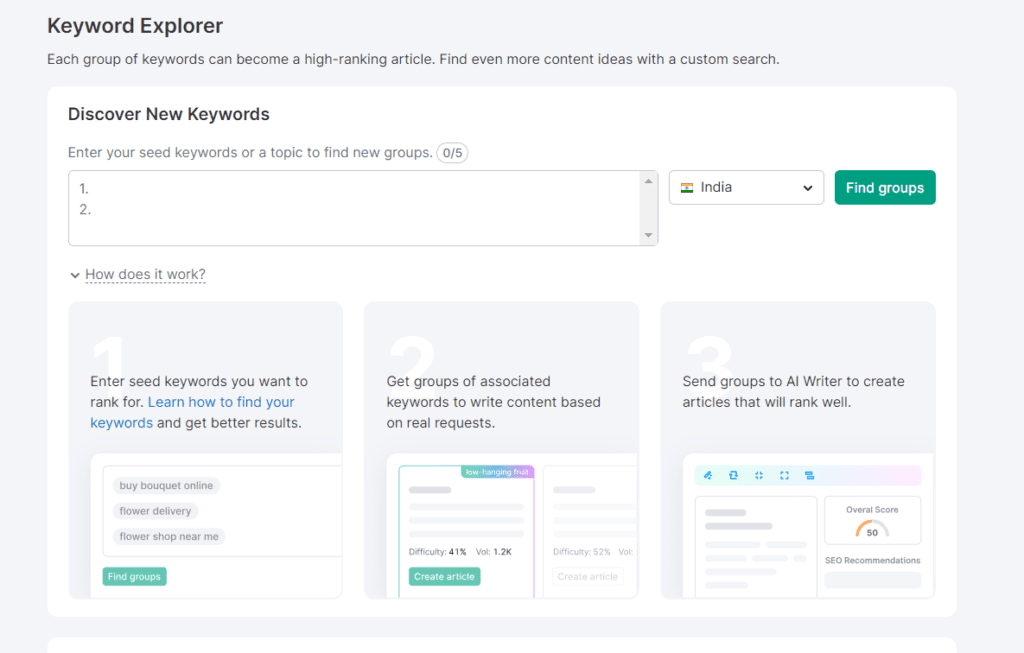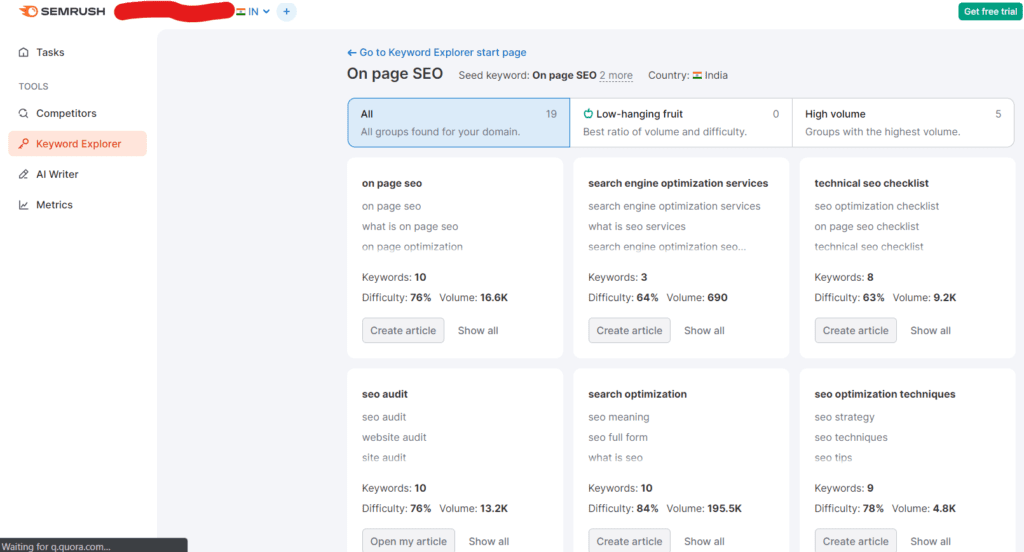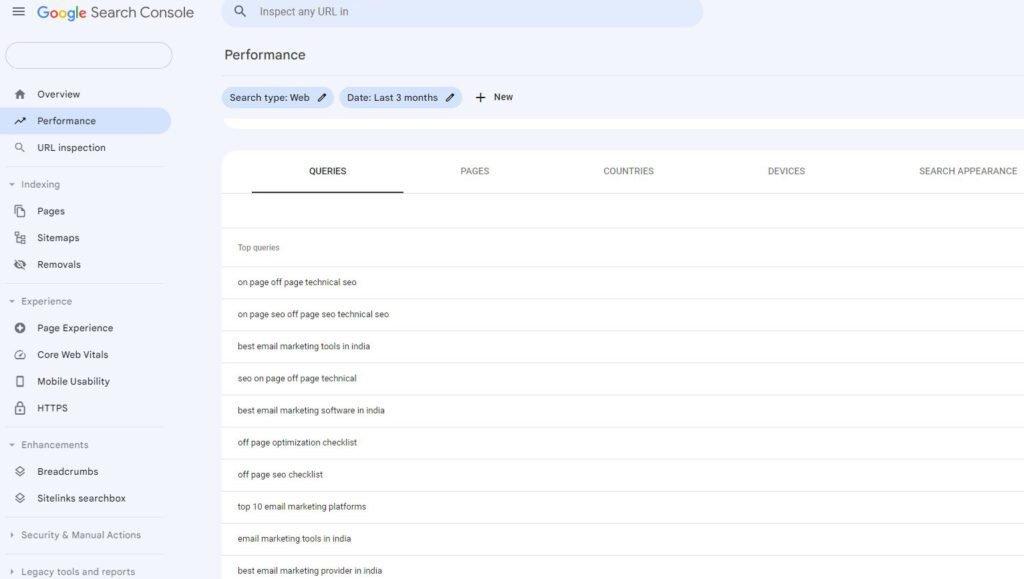
Image By vecstock for article Keyword Research and best Keyword Research tool
Introduction to Keyword Research:
When I’m gearing up to boost a website’s visibility on search engines, I’ve learned that the real game-changers are top-notch content and nailing those keywords. It’s like the heart and soul of the whole SEO adventure. Now, there’s a bunch of other stuff like having solid websites link to yours i.e. quality backlinks, Quality Server hosting , Website user-friendly interface, special codes for search engines i.e. Schema Markup, and, of course, flexing your social media muscles i.e. social media influence. But let me spill the tea on what’s at the forefront – it’s all about that content and choosing the right keywords by following various keyword research tool.
Let’s talk keywords – it’s a bit of an art. Whether I’m tinkering with meta keywords, titles, descriptions, or throwing in some tags for good measure in my blog posts, it’s all about getting those keywords right. Trust me, if you don’t, all the mojo you put into making your website shine in search results might not hit the sweet spot. So, take it from my experience – choosing the right keywords? That’s the secret sauce!
What Is Keyword Research?
Keyword research is the process of identifying and analyzing the search terms or phrases that potential visitors use when searching for content, products, or services on search engines like Google, Bing, or Yahoo. These keywords are the building blocks of your website’s on-page SEO strategy.
How to Do Keyword Research
Alright, let’s break it down. We all know that the key player in the SEO game is having the right keywords in your content. But the big question is: how do you find those high-ranking keywords?
Well, Google is basically your best buddy here. Picture this: you’re about to create a how-to blog on something like “how to delete an Instagram account.” Here’s a pro-tip: open your browser, head to google.com, and in that search bar, type in “How to delete Instagram.” Hit pause for a second. What you see next is pure gold.

Google, being the smart cookie it is, throws out some suggestions based on what folks are actually searching for. It’s like a treasure trove of hot topics and keywords ready for you to include in your “How to delete an Instagram account” blog post. And here’s the magic – these suggestions are always changing because Google’s AI is tuned in to what users are buzzing about in real-time.
So, next time you’re crafting some killer content and diving into keyword selection, put on your visitor hat. Imagine you’re stumbling upon your own article.
Use Keyword Research Tools:
To take your research to the next level, utilize various keyword research tools. Some popular or Best keyword research tool available in market as follow:
Google Keyword Planner:
This free tool provides data on keyword search volume and competition, making it an excellent starting point.
SEMrush:
A comprehensive SEO tool that offers in-depth keyword data, competitor analysis, and more.
Use SEMrush’s Keyword Explorer to find new keywords easily. Just type your chosen keywords into the “Discover New Keyword” box. You can also pick the country you want to focus on to find high-ranking keywords in that location.

I searched for on-page SEO, off-page SEO, and technical SEO for India. Below are the results:

It gives you the volume result and the difficulty level. Also, you can click on Show All to see all the newly discovered keywords that you can focus on while writing an article.
Ahrefs:
Known for its robust backlink analysis, Ahrefs also offers valuable keyword research insights.
Google Search Console:
Google Search Console is a powerful tool offered by Google that enables website owners, developers, and marketers to monitor and manage the presence of their site in Google’s search results. It provides valuable insights into how Google’s search engine perceives your website, offering data on search traffic, indexing status, and any issues that might affect your site’s visibility.
Once you install the Google search console code in your website. you can track important metrics, such as the keywords people use to find your site, the performance of your pages in search results, and the overall health of your site’s presence on the web. Additionally, the tool helps you identify and address any problems that could impact your site’s search ranking.
Let’s focus solely on keyword metrics. I’m sharing a screenshot of my website’s Google Search Console dashboard, which displays the list of keywords that people used to discover my site. So with the help of Google Search console you can get a close idea of keywords that triggers your website on google search engine.

Keep checking our Google Aps menu, as we are going to publish google search console individual detail article soon.
Analyze Your Competitors Keywords:
Study the keywords your competitors are ranking for. Tools like SEMrush and Ahrefs can help you identify which keywords are driving traffic to their websites.
Explore more detailed and specific keyword phrases.
Long-tail keywords are longer and more specific keyword phrases that often have less competition. They can be a goldmine for niche content.
Keyword Metrics:
Pay attention to metrics like search volume, keyword difficulty, and the competitiveness of your chosen keywords. Ideally, aim for keywords with a balance of decent search volume and manageable competition.
Create a Keyword Strategy:
Once you have a list of keywords, create a strategy for incorporating them into your website’s content. Ensure that they naturally fit within your content and do not feel forced.
The Benefits of Keyword Research for Website Ranking:
Improved Organic Traffic: By targeting the right keywords, you increase the chances of your website appearing in relevant search results, ultimately driving more organic traffic.
Enhanced User Experience: Well-researched keywords can help you create content that addresses the needs and interests of your target audience, leading to a better user experience.
Competitive Advantage: Knowing what keywords your competitors are targeting can help you identify opportunities to outperform them in search results.
Increased Conversion Rates: When your content aligns with the search intent of your audience, you’re more likely to attract visitors who are genuinely interested in what you offer, leading to higher conversion rates.
Long-Term Strategy: Effective keyword research is a long-term strategy that can yield results for years to come. It provides a solid foundation for your website’s SEO efforts.
Track and Adapt: Regularly monitoring keyword performance and adapting your content based on the latest trends and user behavior can help you stay at the top of your game in the ever-changing world of SEO.
Conclusion
Keyword research is the cornerstone of successful on-page SEO. By understanding how to conduct effective keyword research and harnessing the power of relevant keywords, you can significantly improve your website’s visibility, attract more traffic, and ultimately boost your search engine rankings. Utilize the aforementioned tools, analyze your competitors, and create a well-defined keyword strategy to take full advantage of this vital aspect of SEO. Remember that keyword research is an ongoing process, so stay vigilant and adaptable to stay ahead in the digital marketing game.
Frequently Asked Questions:
1: What is the purpose of keyword research in SEO?
Keyword research in SEO is essential for identifying the specific search terms and phrases that your target audience uses to find information, products, or services online. It helps you optimize your website content to match these keywords, ultimately improving your website’s visibility and rankings on search engines.
2: How do I start with keyword research?
Begin by brainstorming a list of potential keywords relevant to your website or business. Put yourself in the shoes of your target audience and think about the words they might use to search for what you offer.
3: What are some useful keyword research tools?
Some popular keyword research tools include Google Keyword Planner, SEMrush, Ahrefs, and Moz. These tools provide data on keyword search volume, competition, and other valuable insights to aid in your research.
4: What are long-tail keywords, and why are they important?
Long-tail keywords are longer and more specific keyword phrases. They are important because they often have less competition and can help you target a niche audience more effectively. Long-tail keywords can also be valuable for addressing specific user intents.
5: How can I choose the right keywords for my website?
When selecting keywords, consider metrics like search volume, keyword difficulty, and competitiveness. Ideally, aim for keywords that have a good balance of search volume and manageable competition. Choose keywords that are most relevant to your content and audience.
6: How do keywords benefit website ranking?
Keywords benefit website ranking by improving your website’s relevance to search engines. When your content aligns with well-researched keywords, search engines are more likely to display your website in relevant search results, which can lead to increased organic traffic and higher rankings.
7: Can keyword research help with user experience?
Yes, keyword research can significantly enhance the user experience on your website. When you create content that aligns with the search intent of your audience, visitors are more likely to find the information they seek, resulting in a better user experience.
8: Is keyword research a one-time task?
No, keyword research is an ongoing process. To stay competitive in the ever-changing digital landscape, you should regularly monitor keyword performance, adapt your content to match evolving user behavior and search trends, and refine your keyword strategy as needed.
9: How can I track the performance of my chosen keywords?
You can track keyword performance using various SEO tools, such as Google Analytics, SEMrush, or Ahrefs. These tools provide insights into how your chosen keywords are performing in terms of rankings, traffic, and conversions.
10: Can keyword research benefit any type of website?
Yes, keyword research can benefit a wide range of websites, from blogs to e-commerce sites and informational portals. Any website looking to improve its online visibility and attract a target audience can benefit from effective keyword research and implementation.














3 Comments